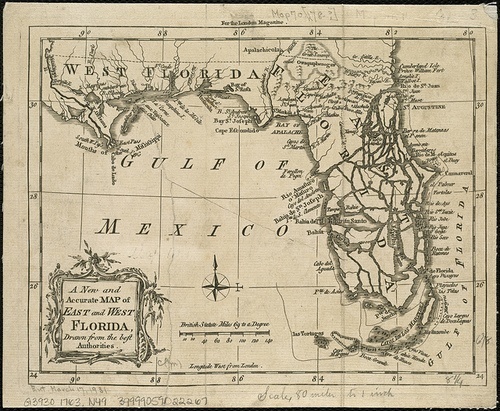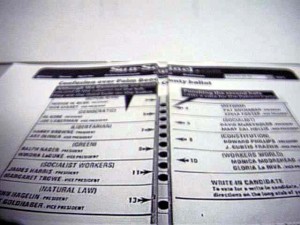
Would Alabama Voters Benefit From the Electoral Leverage Provided by National Popular Vote Plan? | Democracy, elections, and voting at Democracy Chronicles
Electoral Leverage: Florida has it and Alabama lacks it
Author: Rich Rubino
They border each other, yet when it comes to electoral influence, no two states could be farther apart. On the west of the Perdido River lies Alabama. The Yellowhammer State was once part of the Solid South, having voted for the Democratic Presidential nominee every year from 1876 to 1964. It is now a Republican citadel, handily electing the Republican Presidential nominee every year since 1980. Consequently, no Presidential nominee has even campaigned in the state since 1996. Accordingly, the state is designated by Presidential campaigns as a “safe state” and has no electoral leverage.

To the east of the Perdido River lies the electoral Ground Zero: Florida. The Sunshine state is arguably the most critically important battleground state in the nation. No Republican has won the Presidency since Calvin Coolidge in 1924 without carrying the Sunshine state. The result is that Florida shapes the political debate and has a disproportionate influence on setting the political agenda in Washington.
In 2000, both Major Party Presidential nominees, Al Gore and George W. Bush, made adding a Prescription Drug benefit to Medicare their flagship domestic issue. Florida has the largest share of voters over the age of 65 and Prescription Drug coverage was extremely popular with this important constituency. As President, Mr. Bush broke with contemporary Republican fiscal austerity orthodoxy, and put out a full-court press to shepherd The Medicare Prescription Drug, Improvement, and Modernization Act into law. This statute is the largest expansion of an entitlement program since Lyndon B. Johnson’s Great Society.
Furthermore, despite polls showing a majority of Americans favor restoring diplomatic relations with Cuba, Presidential candidates are forced to pledge allegiance to the 50-year-old economic embargo on Cuba because the preponderance of the Cuban-American Community in Florida (especially older Cuban-Americans) strongly support the embargo.
As President, Barack Obama has already visited Florida 16 times. Republican Nominee Mitt Romney predictably will deploy redoubtable resources into the state and make innumerable visits. The state’s Junior U.S. Senator, Marco Rubio, and its former Governor Jeb Bush are speculated as top-tier Vice Presidential selections, chiefly because of their potential to deliver the Sunshine State for Romney. Florida’s economy will likely get a significant economic boost from the entourage of both candidates.
To the west of the Perdido River lies a completely different picture. With Alabama solidly Republican, Presidential nominees see no need to take the concerns of Alabama voters seriously. Campaign tacticians calculate a strategy to win the election based upon appealing to voters in only about 15 swing states, and Alabama does not come close to making the list of states for Presidential campaigns to target. Contrariwise, Florida is at the top of that list. The result is that while the campaigns microtarget constituencies in Florida, they ignore the entire state of Alabama. Once in office, the President, with an eye toward re-election, must focus on the needs of the Sunshine State.
Alabamans are suffering from the economic malaise, yet their voices have little resonance with Presidential candidates. Neither Presidential candidate is likely to visit the state, despite the fact that the state is suffering from a poverty rate of over 17%, and is 49th in the nation in infant mortality. Yet, these are all issues not likely to be addressed merely because of Alabama’s disadvantageous geopolitical position.
There is one way to give voters in Alabama the seat at the electoral table they deserve. That is by adopting the National Popular Vote Plan. The National Popular Vote Plan is an interstate compact, whereby participating states agree to allocate their electoral votes to the winner of the National Popular Vote, as opposed to the candidate who secures the most votes in their state. The compact would take effect when enough states (constituting the requisite 270 electoral votes required to win the Presidential election) agree to participate. Currently eight states and the District of Columbia, constituting 132 Electoral votes, have ratified the compact.
Unfortunately, there is concerted opposition to the Plan by Alabama’s high command, including Secretary of State Beth Chapman. She says it is an “end-run around the Constitution.” This is not true. In actuality, there is no provision in the U.S. Constitution mandating that the President must be selected by a particular electoral method. Accordingly, there is absolutely no need for a Constitutional Amendment to change the method that states use for the awarding of electors. The Founding Fathers could not arrive at a resolution as to how to award electoral votes at the Constitutional Convention. Given this impasse, they decided to delegate “plenary authority” to the states to award their electors, as reflected in Article ll, Section 1, Clause 11 of the U.S. Constitution, which states: “Each State shall appoint, in such Manner as the Legislature thereof may direct, a Number of Electors.” Accordingly, each state has autonomy to select electors in any way that it deems fit.
The National Popular Vote Plan would make every vote equal. With adoption of the plan, Presidential nominees will no longer have an incentive to treat Florida voters like royalty and Alabama voters like serfs. Under the National Popular Vote Plan, a vote in Decatur, Alabama will no longer be less valuable than a vote in Decatur, Florida.
Article Source: https://www.articlesbase.com/politics-articles/electoral-leverage-florida-has-it-and-alabama-lacks-it-5914606.html
About the Author
Rich Rubino, of Marblehead, MA, is the author of the newly published book, The Political Bible of Little Known Facts in American Politics. He holds a B.A. in Political Science and Communications (Media Track) from Assumption College and an M.A. in Broadcast Journalism from Emerson College.
Leave a Reply